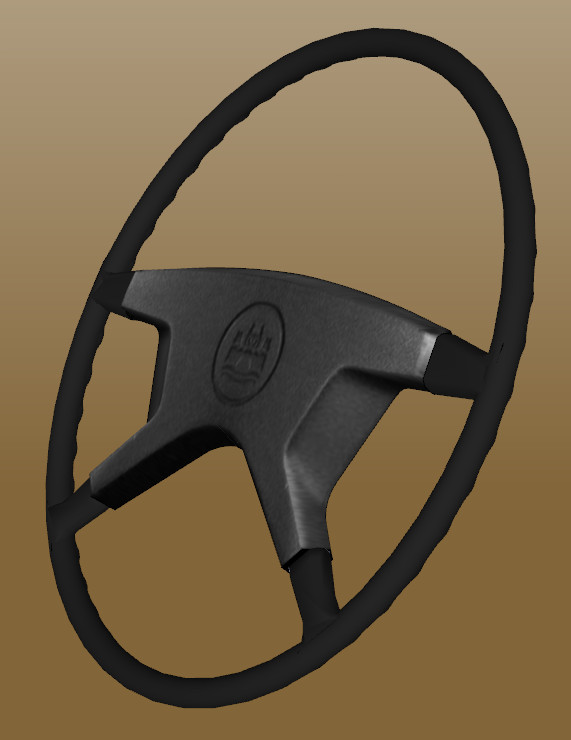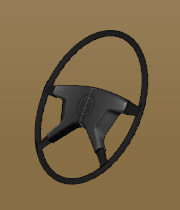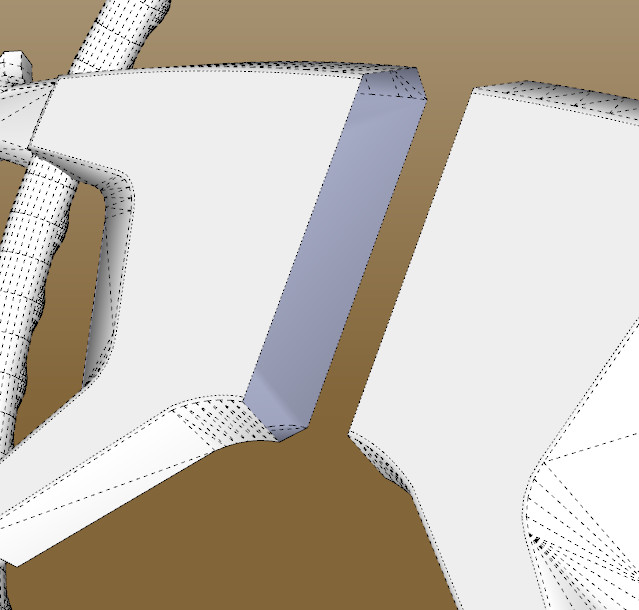Invisible line isn't
-
Just a tiny problem, but it's annoying me. When I view the model at normal distance everything is fine,

but when I back off there is a line visible where the two components join.

It's just a simple model, two components, one copied and reversed and joined together. The inside of the component is painted black to eliminate the "sparklies", and I can see no reason for this to be happening.
I've exhausted my tiny repertoire of troubleshooting skills. Any suggestions?

I know in advance that this will turn out to be something super simple, so I'm gonna go ahead and be embarrassed now

-
If you haven't already checked this: Is there an internal face? Are the common joining edges softened? Are they hidden? Can they be hidden?
-
@mitcorb said:
If you haven't already checked this: Is there an internal face? Are the common joining edges softened? Are they hidden? Can they be hidden?
No, as you can see in the third photo, there is no internal face. I've tried it with the joining edges both softened and hidden, no go.
-
Only other thing to do is to give up the mirror? Explode them make them one component?
-
@mitcorb said:
Only other thing to do is to give up the mirror? Explode them make them one component?
But there should be no reason to do that, I mirror components all the time and have never encountered this problem (except when there is a face between the components)
Here's the skp file. (Please keep in mind that this is just a quick and dirty model to act as a stand-in until I get around to doing it right)
-
So, here's where I start grabbing at straws. What if it has something to do with OpenGL settings? I think way back in the dim past, TIG may have held forth on this same thing in an old thread. I am not hinting at age, you timeless wizard. I can't afford to.
-
@mitcorb said:
What if it has something to do with OpenGL settings?
I really don't see how that could be the problem. I've changed nothing, and the model I'm working on has plenty of mirrored components, and they all look fine except for the steering wheel horn.
Am I gonna have to call an exorcist?

-


Here's something vaguely related. In the time between, it's all I could find using search "edge visibility". Now, I am not saying it is the answer.
http://forums.sketchucation.com/viewtopic.php?f=323&t=40640&p=360010&hilit=edge+visibility#p360010Another thing: these edges are duplicated where the components meet. Obviously. So it would seem there can be a solution, because this isn't the first time.
-
One thing I suppose I should mention - I originally created the model on my desktop, and didn't notice the problem there. I copied everything to my laptop, which I am using now, and noticed the problem as soon as I opened the model. I'm at a coffee shop right now, as soon as I get home I'll see if it also appears on my desktop.
-
Hi, hellnbak:
This may have nothing to do with it either, but you know how sometimes you can have these weird artifacts when you remove coplanar edges and the surface has some faint shadings where the program wants to put some lines, but you don't want them there? I thought I saw something like that on the back side of the model. But of course, that wouldn't matter for the primary view.
Nice model, by the way. I consider it very compact and economical.
Just saw your coffee shop post. But I will submit this anyway. -
Steve, this is sort of an OpenGL problem. I don't think there is a solution for it unless you replace the material image with one of the whole center section and make it one hunk of geometry. It appears that we're seeing the edge of the material image. I wonder if it has to do with the unused white right half of your material. Why don't you crop the image down and get rid of the white on the right half?
-
This may have to do with me inspecting the model, opening components, and such, but I did find a hard edge right there where you pointed to. Of course, Dave's comment may be the ticket.
-
Well, I'm home now, and the model looks just fine on my desktop (the same model I copied to my laptop).
Now I'll copy the model from my laptop to my desktop and see what happens.
I really appreciate your comments and suggestions.
Why can't I ever have a normal problem?

-
Well, I copied the dang thing back to my desktop and of course it's fine now.
I don't understand, I copy models back and forth all the time and there's never been a problem. And if it got messed up somehow while being copied, why just the steering wheel horn? All of the other mirrored components (and there are a lot) look ok.
Wait, I just thought of the solution!!! I'm gonna take a hammer to my laptop! That'll be fun
-
You some times see lines like that where geometry in different groups/components meet. It's the calculations of the pixels that doesn't meet up 100%. I usually get around it by applying the front material to the back. It can appear as though occasionally there are leaks where you see into the back/inside of the mesh.
-
@thomthom said:
You some times see lines like that where geometry in different groups/components meet. It's the calculations of the pixels that doesn't meet up 100%. I usually get around it by applying the front material to the back. It can appear as though occasionally there are leaks where you see into the back/inside of the mesh.
Ya beat me to the answer.
For some time now, I have set both front and back default faces to white. Orient faces does not always work properly.
And, more importantly, I set both front and back faces to the very same texture/color.
That eliminates any phantom lines, and if there is an unwanted internal face, it shows as a white line on the surface. -
@jgb said:
Orient faces does not always work properly.
It won't work properly if your mesh has edges that connected to more than two faces. Then it's impossible to determine orientation.
I'd still try to orient faces correctly because tools will some times require faces to be oriented properly - otherwise unpredictable results occur. -
@thomthom said:
@jgb said:
Orient faces does not always work properly.
It won't work properly if your mesh has edges that connected to more than two faces. Then it's impossible to determine orientation.
I'd still try to orient faces correctly because tools will some times require faces to be oriented properly - otherwise unpredictable results occur.Yeah, JPP and Curviloft in particular.

Maybe their next update should include an implicit Orient Faces before getting down to business.
I keep forgetting.
-
@jgb said:
Maybe their next update should include an implicit Orient Faces before getting down to business.
I keep forgetting.
Make your back face color really obnoxious and work in Monochrome face style. You won't forget.

-
While all this info is well and good, and much appreciated, the thing is, I've done hundreds of mirror reverse components (at least), all done exactly the same way, and this is the first time this problem has reared it's ugly head. If it was something I had tried for the first time or if I had done something even a little different, that might explain it. But by now doing this is second nature to me, so all of the possible explanations offered up simply (IMO) do not apply. There's nothing different about this simple and very basic model that should or could explain that accursed white line down the middle of the steering wheel horn.
But I've put this behind me, and until it happens again I'll just add it to the ever-increasing list of weird things that happen in SU that you just have to live with
Advertisement







